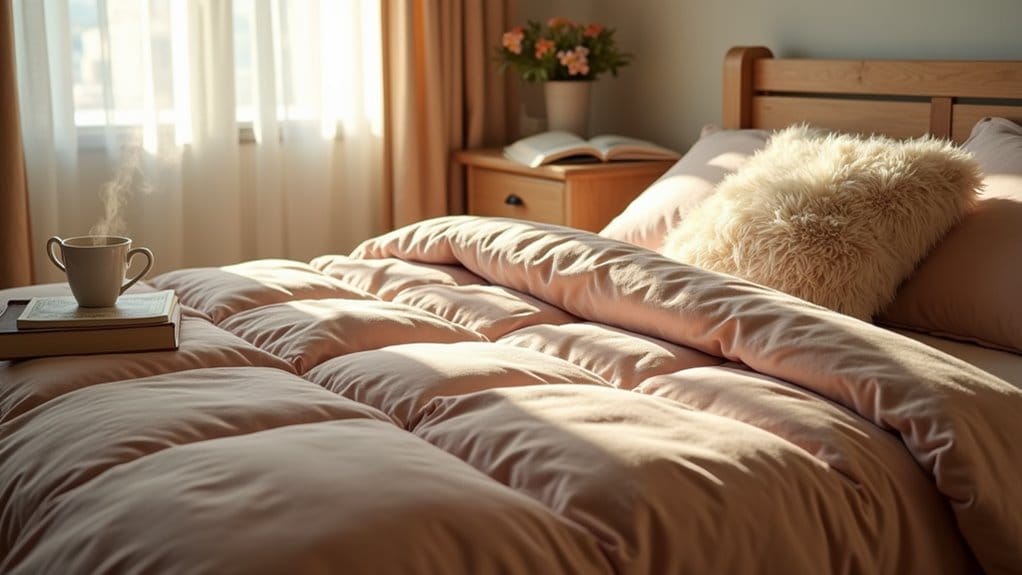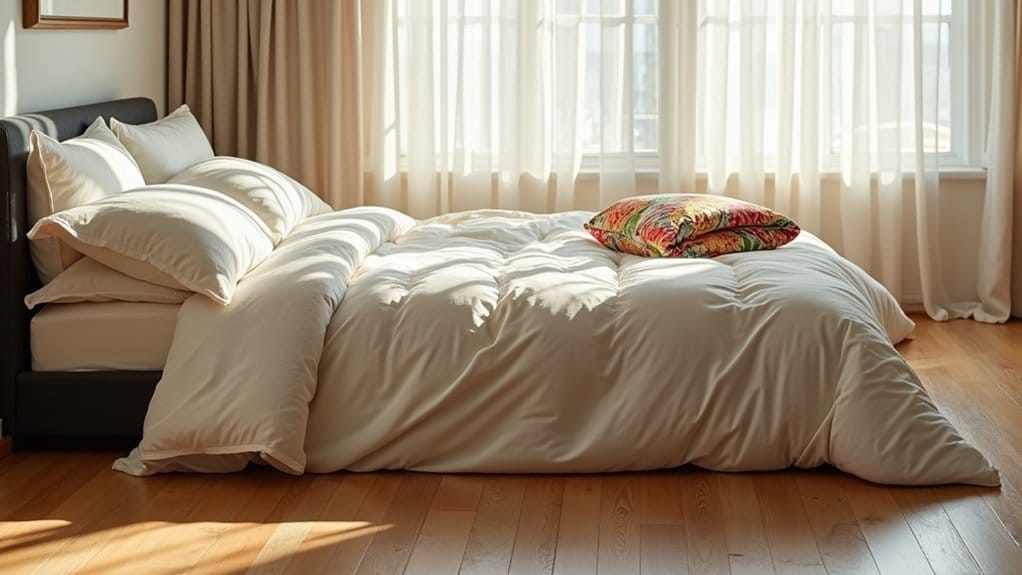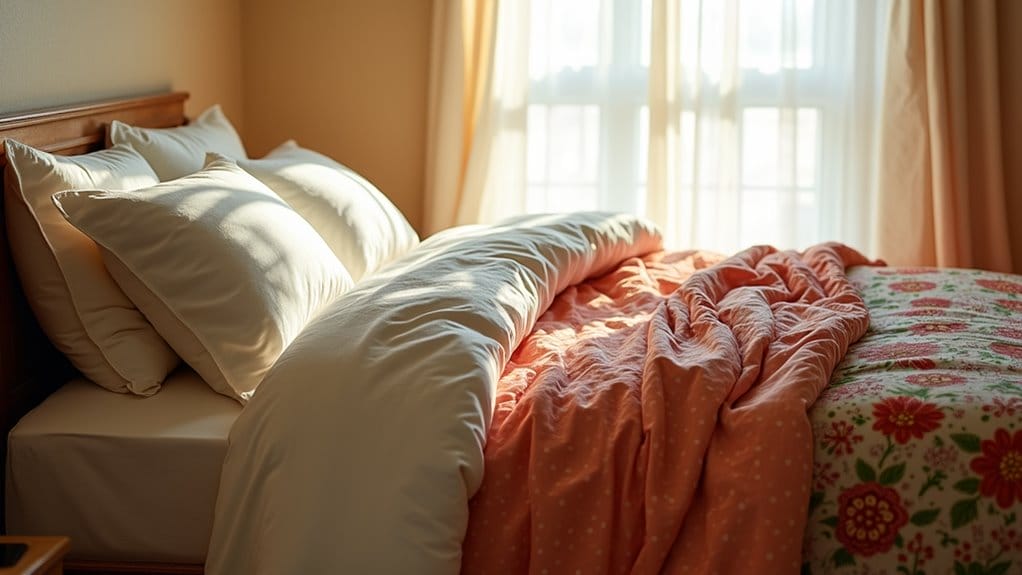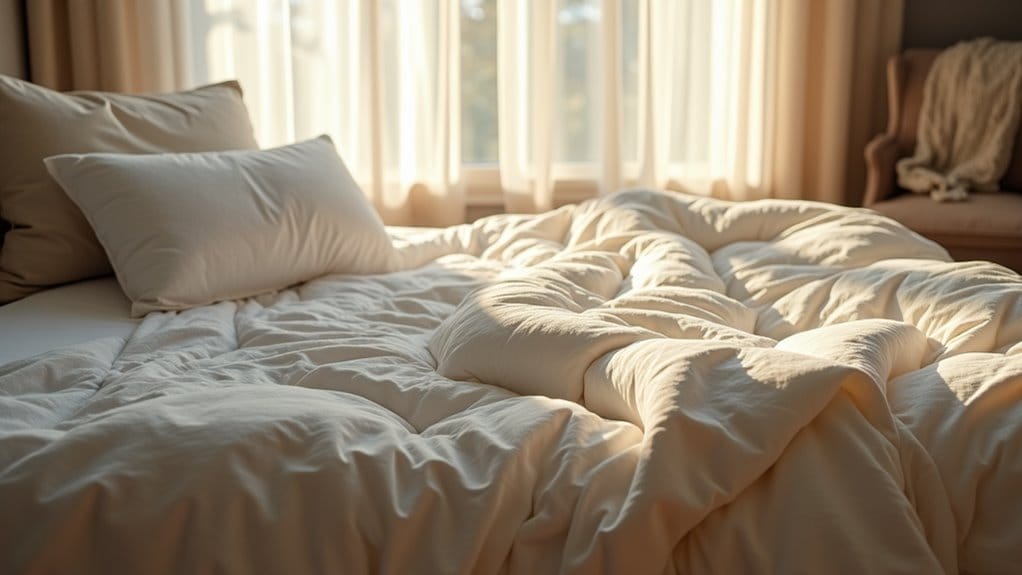Can You Use A Duvet Without A Cover? The Benefits and Drawbacks
Have you ever thought about using a duvet without a cover? It can make bed-making a breeze and might feel softer against your skin, but there are a few things to consider.
On the flip side, going without a cover can lead to more stains and allergens. So, is the convenience really worth it? Let’s dive into some insights that could change how you view your bedding choices.
Benefits of Using a Duvet Without a Cover

Using a duvet without a cover offers a range of benefits that make it an appealing choice for many.
First off, bed-making becomes a breeze. I can quickly toss my duvet onto the bed without wrestling with a cover.
Plus, I love the reduced laundry. I wash the duvet itself, saving time and effort. Regular laundering is essential for hygiene, as it helps prevent dust mite build-up.
It’s cost-effective too; skipping the duvet cover saves money.
The direct comfort is a game-changer—there’s nothing like the cozy feel of the duvet against my skin. Additionally, using a duvet without a cover can lead to less frequent washing since only the duvet needs cleaning.
A minimalistic look also makes my bedroom appear streamlined and tidy.
And let’s not forget the variety! I can choose from many colors and materials that fit my style.
It’s practical and stylish all in one!
Drawbacks of Using a Duvet Without a Cover
While the convenience of a duvet without a cover is tempting, there are several drawbacks I’ve encountered.
I’ve found that it can lead to cleanliness issues and added maintenance. Here are some key points to evaluate:
- Stains and spills often damage the duvet.
- Wear and tear increases without a protective cover.
- Dust and allergens accumulate, impacting health, as regular cleaning is crucial for maintaining duvet hygiene.
- Limited lifespan due to dirt exposure.
Additionally, washing a bulky duvet can be a hassle, and it’s tough to keep it looking fresh. Duvets require regular washing to maintain cleanliness, which can be cumbersome without a cover.
I’ve also noticed that the duvet fades faster in the sun and loses its cozy feel over time.
Advantages of Duvet Covers

Duvet covers offer a multitude of benefits that can greatly enhance your bedding experience.
First off, they protect your duvet from stains and wear, extending its lifespan. I’ve noticed that I wash my duvet less often, which saves time and effort.
Aesthetically, duvet covers let me change the look of my bed effortlessly. With so many colors and patterns available, I can easily refresh my bedroom decor.
Convenience is another big plus. Changing and washing the cover is a breeze, making bed-making quick and simple. Additionally, duvet covers allow for customization in appearance, giving me the flexibility to alter my bedroom’s style with ease.
Lastly, they’re versatile! I sometimes use my duvet cover as a lightweight top sheet or for cozying up on the couch.
Duvet covers truly elevate my bedding game!
Pros and Cons of Coverless Duvets
When it comes to choosing whether to use a duvet with or without a cover, I find it essential to weigh both the pros and cons.
Here’s what I’ve learned:
- Convenience: No need to fuss with covers, making bed-making a breeze.
- Cost-Effective: You save on buying and replacing duvet covers, plus laundry costs drop.
- Direct Comfort: Feeling the duvet’s softness directly enhances your sleep experience, as many down alternatives offer hypoallergenic benefits for a more comfortable sleep.
- Simplified Aesthetics: A minimalist look can be invigorating, reducing visual clutter. Additionally, coverless duvets are typically fully machine washable, which makes cleaning easier despite the need for more frequent washes.
On the flip side, there are cleanliness issues, durability concerns, and limited aesthetics.
You might deal with more frequent washes and potential wear.
Ultimately, it’s about what works best for your lifestyle and comfort preferences.
Duvets vs. Comforters

Choosing between a duvet and a comforter can feel overwhelming, especially with so many options available. I’ve gone back and forth on this, and here’s what I’ve found.
| Duvets | Comforters |
|---|---|
| Often need a removable cover | Sold as a single unit |
| Offer customization options | Easier to wash all at once |
| Require care to prolong life | Generally more affordable |
Duvets let you change the look of your bed easily, but they do require a little more effort to maintain. Comforters are straightforward and great for quick bed-making. Additionally, understanding duvet terminology will help you make a more informed choice. Ultimately, it boils down to what fits your lifestyle best. Additionally, using a duvet cover acts as a protective layer against dust, dirt, and stains, enhancing the lifespan of the duvet insert.
Choosing Between Duvet and Comforter
After weighing the pros and cons of duvets and comforters, I’ve realized that the decision truly depends on your personal needs and preferences.
For me, here are four key points to evaluate:
- Maintenance: Duvets are easier to clean since you can wash the cover separately. This means you can keep your bedding fresh and clean with minimal effort, thanks to the ease of cleaning that duvet covers provide. Additionally, changing duvet covers regularly can enhance the longevity of your bedding.
- Customization: If you love changing up your decor, duvets let you switch covers easily.
- Convenience: Comforters are ready to use right away, which saves time.
- Cost: Comforters can be more affordable, especially if you’re on a budget.
Ultimately, think about what matters most to you.
Whether it’s convenience or style, both options have their perks.
Just pick what fits your lifestyle best!
Personal Preferences in Bedding Choices

Bedding choices really come down to personal preferences, and I’ve found that everyone’s needs are unique. For me, the texture of a duvet without a cover feels incredibly soft and cozy, but I know some prefer the feel of a cover for its variety.
Aesthetically, duvet covers offer so many options. I love switching mine out for different seasons, giving my bedroom a fresh look. Plus, they’re easier to clean and protect my duvet from spills.
While I appreciate the convenience of not using a cover for quick bed-making, I’ve learned the hard way that it leads to more frequent washes.
Balancing immediate comfort with long-term care is key, and I’ve settled on using a duvet cover for both style and practicality.
Frequently Asked Questions
How Often Should I Wash a Duvet Without a Cover?
I wash my duvet without a cover every two to four weeks, depending on how much I use it. Keeping it clean helps avoid allergens and maintain hygiene, even if it requires extra effort.
Can a Duvet Be Used Alone in Winter?
Definitely! I’ve used just a duvet in winter, and it’s warm and comfy. Just remember, it can get stained easily and may need more frequent washing than if you use a cover.
What Materials Are Best for a Duvet Without a Cover?
For a duvet without a cover, go for breathable cotton or linen for comfort. Microfiber is easy to maintain. Skip delicate fabrics, as they don’t stand up to frequent washing.
How Do I Store a Duvet Without a Cover?
Before storing your duvet, ensure it’s clean and dry. Use a breathable bag, keep it in a dry spot, and avoid folding to protect its shape and quality.
Are There Any Hypoallergenic Options for Coverless Duvets?
Yes, there are hypoallergenic coverless duvets. They use breathable materials and hypoallergenic fillings to reduce allergens. Just keep in mind they may need more frequent cleaning to stay effective.
In Conclusion
Using a duvet without a cover can be a cozy and low-maintenance option, but it’s not without its drawbacks. I’ve loved the comfort and simplicity, but I’ve also dealt with some stubborn stains.
If you’re all about that easy life, go for it! But if you want your duvet to last longer and stay clean, getting a duvet cover is the way to go.
